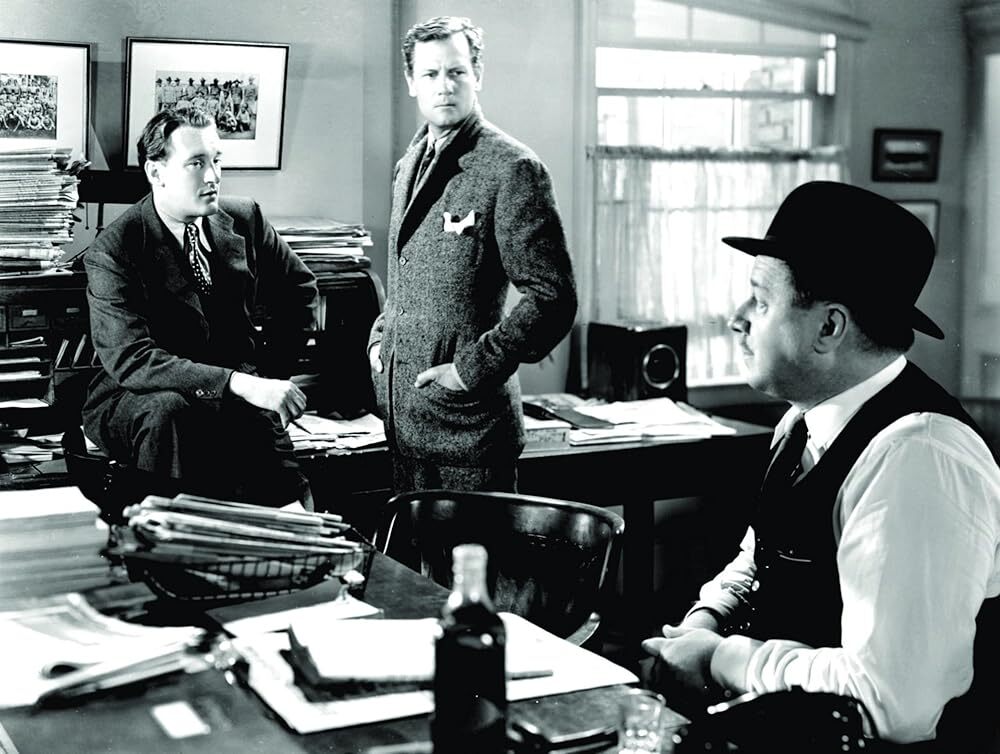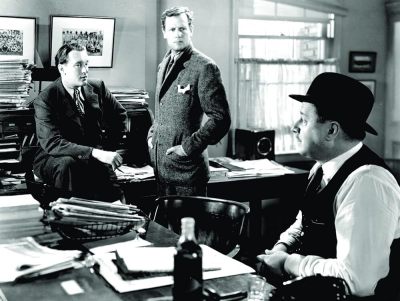A dictator begins a brutal conquest of Eastern Europe. His agents stage a covert campaign to manipulate the West into staying on the sidelines. Ghastly barbarism dominates the news. And yet many Americans are surprisingly apathetic to the rising crisis.
That may sound like geopolitics in 2024, but it also describes Alfred Hitchcock’s 1940 spy thriller Foreign Correspondent. Starring Joel McCrea as journalist John Jones, it was just Hitchcock’s second Hollywood production after moving to the United States. Although it’s now one of the more neglected entries in the Hitchcock canon, the film is also an artful plea for Americans to recognize the calamity they faced in World War II. It was timely in 1940, and it remains full of enduring themes about the never-ending fight against tyranny.
Foreign Correspondent follows Jones on assignment to Europe in the opening days of the war, giving the audience a front-row seat to the breakdown of global order. As tyrants threaten to tear the world apart, Jones begins the film essentially ignorant of the great events roiling history. This is partly why Mr. Powers (Harry Davenport), his editor, prefers him to more seemingly erudite writers on staff. Jones does not have grand political theories or macroeconomic explanations or ideological formulae to bias his reporting on Europe. Instead, he is just a “good honest crime reporter”; in Powers’ mind that makes him the perfect person to report on the “crime hatching on that bedeviled continent.” Jones’ straightforward sense of right and wrong is his greatest asset.
Foreign Correspondent is a great action movie, but it is also a moving tribute to the power of the truth. In the film as in history, the Nazi antagonists employ blackmail, torture, and assassination to advance their wicked designs. Above all, they hide under a cloak of secrecy—a cloak that our intrepid journalist-heroes throw off to rouse the public. At its best, journalistic writing is a moral enterprise that requires an almost spiritual dedication to telling things like they are. The writer who seeks to capture contemporary events must unflinchingly address the terror of modern times.
In the process, Jones is pulled deeper and deeper into the European crisis. The more Jones learns of Nazi schemes against Western Europe, the more outraged he becomes. He starts off as something of a naïve bumbler, but by the end of the film he dedicates himself to uncovering the truth and informing the American public because it is simply the right thing to do.
It is precisely that kind of truth-telling, however, totalitarian powers work so hard to stop. In a January 1945 essay titled “The Prevention of Literature,” George Orwell wrote, “Freedom of the intellect means the freedom to report what one has seen, heard, and felt, and not to be obliged to fabricate imaginary facts and feelings.” Totalitarian regimes seek to prevent that kind of reporting to cover up their many crimes. “What is really at issue is the right to report contemporary events truthfully,” Orwell concluded, and writers have a responsibility to do just that despite the danger it may entail.
Jones himself encounters many dangers as the plot races by. Classic Hitchcockian action scenes include a chase through a sea of umbrellas, a tense sequence set in a Dutch windmill, and a nerve-wracking tussle atop Westminster Cathedral. Set pieces such as a plane crash in the Atlantic also give the audience a sense that Jones is racing against time. The director’s characteristic style and panache, even humor, delightfully permeate the movie. The action and glamour lend Jones’ quest for truth a real excitement.
Importantly, Hitchcock also introduces elements of genuine horror to disclose the true nature of the fascist threat. Although the camera does not linger on them, the murders committed by Nazi agents are shockingly bloody. One particularly gruesome scene involves the torture of a Dutch peace activist. Hitchcock doesn’t depict the torture on screen, instead cutting away to the reaction of those observing it. The audience is left to imagine the depths of depravity to which these ideological thugs will resort. (Minor spoilers ahead!)
The deepest horror of the film, though, is the way Hitchcock depicts how some in the West collaborated or conspired with the enemy. Carol Fisher, Jones’ love interest (Laraine Day), and her father Stephen Fisher (Herbert Marshall) are leading members of the “Universal Peace Party,” an organization of pacifists working to prevent the outbreak of war. As Jones unravels the Nazis’ conspiracy, however, he reveals that Stephen Fisher is the traitor at the heart of it all.
In part through this twist, Foreign Correspondent exposes pacifism as a foolish ideology. Hitchcock understood that fascists exploit pacifists’ fears of war to manipulate Western society into a position of weakness. But as Orwell also observed in his 1942 essay “Pacifism and the War,” in actuality we lacked “any real way of remaining outside such a war as the present one.” Through the film, Hitchcock—like our hero Jones—inspired Americans to rediscover their fighting spirit and resist the siren call of pacifism and isolationism.
On first watch, Foreign Correspondent may seem like a sort of glorified B-movie, but its deeper message holds that telling the truth is essential to keeping mankind free. “Whoever feels the value of literature, whoever sees the central part it plays in the development of human history,” Orwell said in a June 1941 broadcast titled “Literature and Totalitarianism,” “must also see the life and death necessity of resisting totalitarianism, whether it is imposed on us from without or from within.” Freedom is worth fighting for using every weapon in our arsenal—including the pen and the camera.
Foreign Correspondent begins with an opening crawl dedicating the film to the reporters who told the truth about the crisis in Europe: “To those forthright ones who early saw the clouds of war while many of us at home were seeing rainbows …” In our own time, we must sadly admit that many are still “seeing rainbows.” While the Ukrainian and Israeli peoples fight bravely against tyranny, and the Taiwanese prepare for a potential invasion, it is altogether too easy for Americans to see these events as distant or perhaps even irrelevant.
Rewatching Foreign Correspondent, though, one realizes we cannot afford to look away. In moments of crisis such as these, we need the truth more than anything else.






Please note that we at The Dispatch hold ourselves, our work, and our commenters to a higher standard than other places on the internet. We welcome comments that foster genuine debate or discussion—including comments critical of us or our work—but responses that include ad hominem attacks on fellow Dispatch members or are intended to stoke fear and anger may be moderated.
With your membership, you only have the ability to comment on The Morning Dispatch articles. Consider upgrading to join the conversation everywhere.